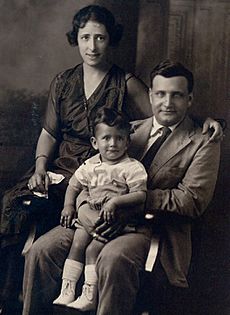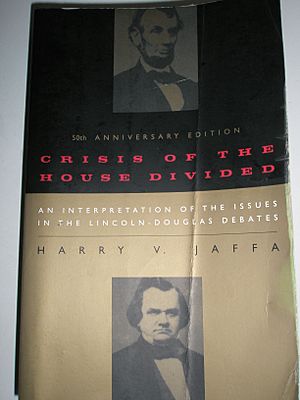Harry V. Jaffa facts for kids
Quick facts for kids
Harry V. Jaffa
|
|
|---|---|
| Born |
Harry Victor Jaffa
October 7, 1918 New York City, New York, U.S.
|
| Died | January 10, 2015 (aged 96) Pomona, California, U.S.
|
| Alma mater | Yale University (BA) The New School (PhD) |
|
Notable work
|
Crisis of the House Divided (1959) |
| Spouse(s) |
Marjorie Etta Butler
(m. 1942; died 2010) |
| Scientific career | |
| Institutions | Ohio State University Claremont McKenna College Claremont Graduate University Claremont Institute |
| Thesis | Thomism and Aristotelianism (1950) |
| Doctoral advisor | Leo Strauss |
| Notable students | |
| Influences | Walter Berns |
Harry Victor Jaffa (born October 7, 1918 – died January 10, 2015) was an American thinker. He was a political philosopher, a historian, a writer for newspapers, and a professor. He taught at Claremont McKenna College and Claremont Graduate University. He was also a special member of the Claremont Institute.
Jaffa wrote about many important topics. These included ancient Greek philosopher Aristotle, Christian thinker Thomas Aquinas, and American President Abraham Lincoln. He also wrote about natural law, which are rules that are believed to be part of human nature. His writings appeared in famous magazines like National Review and newspapers like the New York Times.
His most famous book, Crisis of the House Divided, was written in 1959. It is about the important debates between Abraham Lincoln and Stephen Douglas. Many people have called it "the greatest Lincoln book ever." Jaffa helped shape the conservative movement in America. He challenged other thinkers about Lincoln and the founding of the United States. He passed away in 2015.
Early Life and Education
Harry V. Jaffa was born in New York City on October 7, 1918. His parents were Arthur Solomon Jaffa and Frances Landau Jaffa. His middle name, Victor, was chosen because World War I ended in the same year he was born. His family was Jewish.
He studied English literature at Yale University and earned a Bachelor of Arts degree. Later, he earned a PhD (Doctor of Philosophy) in political philosophy from The New School. While studying for his PhD, he became very interested in Abraham Lincoln. He found a copy of the famous Lincoln–Douglas debates in a used bookshop.
Jaffa was one of the first students of a famous teacher named Leo Strauss. Jaffa's PhD paper was about Aristotle and Thomas Aquinas. This paper later became his first book, Thomism and Aristotelianism. In this book, he wrote that Aquinas's Christian beliefs influenced his ideas about Aristotle.
Career and Main Ideas
Jaffa taught at Ohio State University from 1951 to 1964. After that, he moved to Claremont, California, to teach.
America's Founding Principles
Jaffa believed that the people who founded the United States, like Thomas Jefferson, James Madison, and George Washington, built the country on important political ideas. He thought these ideas came from thinkers like John Locke and Aristotle.
He believed that governments are created to protect people's rights. But he also thought governments serve a higher purpose: to help people be happy. Jaffa pointed out that Aristotle's book Politics talks about safety and happiness as key goals for a good society. He also noted that James Madison and George Washington linked human happiness with government. This showed, to Jaffa, that America's founding ideas had deep roots in ancient philosophy.
Abraham Lincoln's Ideas
Jaffa wrote two important books only about Abraham Lincoln. The first was Crisis of the House Divided, published in 1959. Forty years later, he wrote A New Birth of Freedom. Jaffa also wrote many articles about Lincoln for the Claremont Institute and other journals.
Before Jaffa, many conservative thinkers believed that Lincoln's presidency led to too much federal power. But Jaffa argued that Lincoln's actions were important for protecting individual rights. Jaffa also believed that the Declaration of Independence and the Constitution work together. He thought the Constitution was meant to protect the ideas of the Declaration.
Crisis of the House Divided
In Crisis of the House Divided, Jaffa wrote about the Lincoln–Douglas debates. These debates happened just before the American Civil War. In the 1850s, people were very worried about slavery spreading into new territories and states.
Stephen A. Douglas suggested "popular sovereignty." This meant that people in each territory could decide if slavery would be legal there. But Lincoln thought this idea was unfair. He believed that a majority of people should not be able to enslave others. Lincoln argued that the founding idea "All men are created equal" meant slavery was wrong. Lincoln and Douglas debated these ideas when they ran for a Senate seat in Illinois in 1858.
Jaffa explained the deep ideas behind Lincoln's and Douglas's arguments. He believed that Lincoln used ideas from the Declaration of Independence, especially the idea that "all men are created equal."
A New Birth of Freedom
A New Birth of Freedom was planned as the first of two books about Lincoln's Gettysburg Address. This first book focuses on Lincoln's first speech as president and his speech to Congress on July 4, 1861.
Jaffa argued that the Gettysburg Address is not just a standalone speech. He saw it as part of a bigger story, like a speech in a play. He said it was part of the "tragedy of the Civil War," and Lincoln was like a tragic hero.
Jaffa called human equality America's "ancient faith." He believed the Declaration of Independence showed the ideas of natural law. Jaffa thought Lincoln's job was to bring back America's belief in these ideas. He wanted to save the Union from the idea that human equality was not a natural right. Jaffa believed that the Confederacy's ideas, especially those of John C. Calhoun, were very different from the American founders' ideas about equality.
Debates with Other Thinkers
Jaffa often debated other conservative and libertarian thinkers who criticized Abraham Lincoln. He argued that Lincoln's actions were important for conservative values. He also wrote a book called Storm Over the Constitution (1999). In it, he shared his ideas about constitutional law, connecting it to the Declaration of Independence.
Jaffa also disagreed with other well-known conservatives like Russell Kirk and Richard M. Weaver. He spent his life explaining why the Declaration of Independence, with its idea that "all men are created equal," was so important for everyone.
Debate with Thomas DiLorenzo
Jaffa debated another writer, Thomas DiLorenzo, on May 7, 2002. Jaffa made several key points:
- The South Was a Closed Society: Jaffa said that in the 1860 election, Lincoln was not even on the ballot in many Southern states. He also pointed out how unfair the Fugitive Slave Act was. This law made it very hard for accused runaway slaves to prove they were free.
- Secession Is Not Revolution: Jaffa explained the difference between a revolution and secession. A revolution, he said, is when people change their government because it is harming their safety and happiness. But the Southern states claimed they had a right to secede under the Constitution, even though their rights were not being violated.
- Steps to Southern Secession: Jaffa believed the first step to secession happened at the 1860 Democratic Convention. Southern states demanded a "slave code" for new territories. When this was not granted, they left the convention. Jaffa also noted that slavery was expanding, especially after the Kansas–Nebraska Act and the Dred Scott case.
- The Lincoln–Douglas Debates: Jaffa argued that Stephen Douglas accepted the Dred Scott decision. This decision said that the right to own slaves was clearly stated in the Constitution. Lincoln disagreed, saying it was only implied. Jaffa believed that Douglas's view could lead to slavery expanding almost everywhere.
Views on Robert Bork
Jaffa believed that Robert Bork, a former Supreme Court nominee, had ideas about American constitutionalism that went against the principles of the Declaration of Independence. Jaffa thought Bork's ideas were too focused on what the law literally said, rather than on natural law principles. Bork, however, felt that Jaffa's approach allowed people to interpret the Constitution based on what they wanted it to say.
National Review Magazine
Jaffa was good friends with William F. Buckley, who founded National Review magazine. Jaffa published many articles about Lincoln in this magazine. He said Buckley helped him publish his work when other magazines would not.
However, Jaffa disagreed with some other writers at National Review. He felt they did not fully support the idea from the Declaration of Independence that "all men are created equal." Jaffa spent his life emphasizing how important this idea was for everyone.
Barry Goldwater Campaign
During the 1964 presidential campaign, Jaffa worked as a speechwriter for Republican candidate Barry Goldwater. Jaffa wrote a famous line for Goldwater's acceptance speech: "Extremism in the defense of liberty is no vice, and moderation in the pursuit of justice is not a virtue." Goldwater often said this line came from the ancient Roman speaker Cicero, but Jaffa was actually the one who wrote it.
Death
Harry V. Jaffa passed away at Pomona Valley Hospital on January 10, 2015.
Personal Life
Jaffa married Marjorie Butler in 1942. She passed away in 2010. They had three children: Donald, Philip, and Karen.
See also
 In Spanish: Harry V. Jaffa para niños
In Spanish: Harry V. Jaffa para niños



